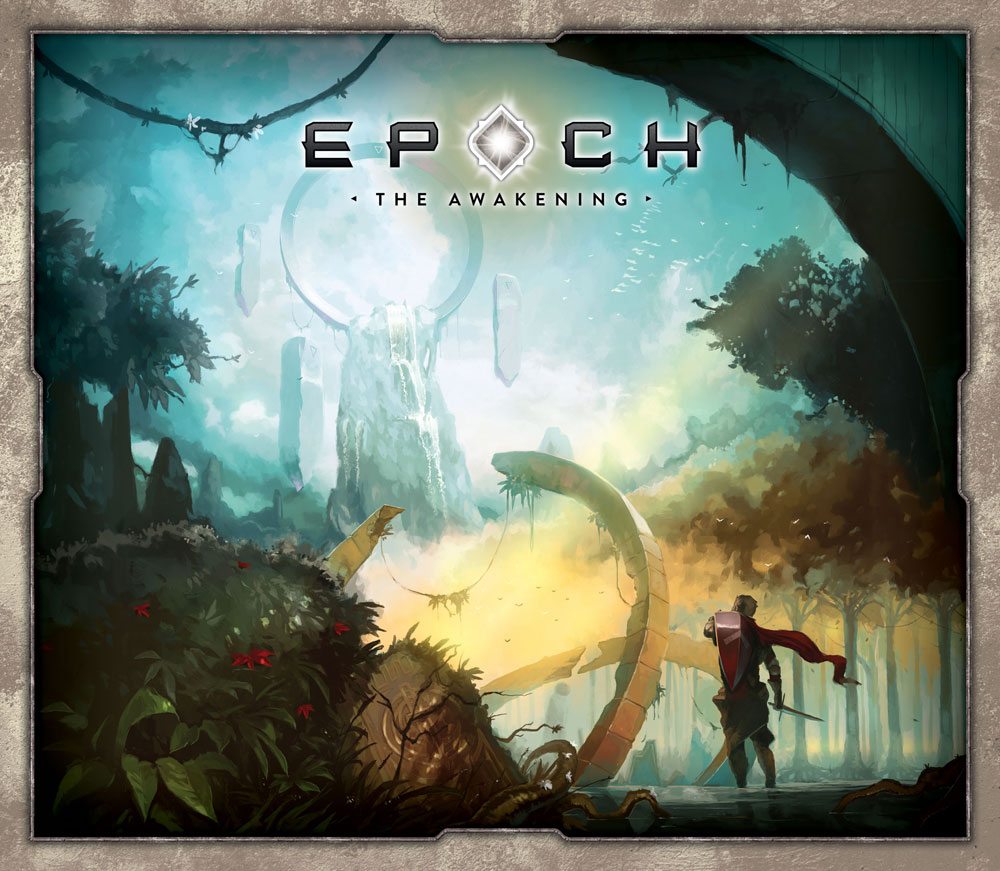You are a wretch. Cast onto this hostile island, you will work to regain honor—gaining mastery of heroic attributes, recruiting companions, defeating monsters, and acquiring relics. This is the world of Epoch: The Awakening.
At a glance: Epoch: The Awakening is a game by Marc Neidlinger for 2 to 5 players, ages 14 and up, and takes about 15–30 minutes per player. (Closer to 30 minutes when you’re learning, but it gets much faster with experience.) It’s currently seeking funding on Kickstarter, with a pledge level of $49 for the base game, or $59 for the deluxe version that includes the Myths and Wonders mini-expansion. I think the gameplay could work for somewhat younger players as long as they have some gaming experience, but I probably wouldn’t go much younger than 10 myself. The theme does include some war and monsters, but it’s fairly abstracted.
New to Kickstarter? Check out our crowdfunding primer, and visit our curated page for more projects we love.
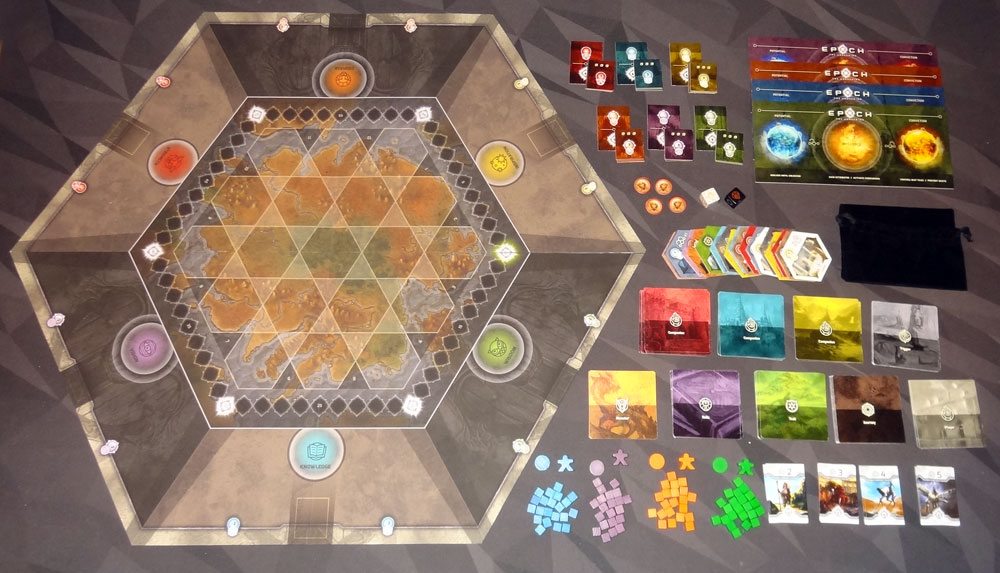
Components
Note: My review was based on a pre-production prototype, so although much of the artwork was finalized, the component quality may not reflect the finished product. In particular, the finished game may be upgraded with miniatures depending on stretch goals, but those were not included in the prototype. Also, the prototype only included components for 4 players rather than 5.
- Game board
- 4 Trigger tokens
- 5 Player boards
- 5 scoring tokens
- 105 influence blocks (21 in each player color)
- 5 Player standees
- 19 Location tiles
- Cloth bag
- 110 Cards
- 45 Companion cards (15 each red, blue yellow)
- 12 Relic cards (purple)
- 12 Monster cards (orange)
- 12 Trait cards (green)
- 12 Journey cards (brown)
- 12 Trigger cards (dark grey)
- 5 Wretch cards (light grey)
- 6 Mastery tokens
- 20 Proficiency tokens
- 20 Mount Upgrade tokens
- 2 custom dice
I like the overall look of this game: the board has a dark, stone-like appearance, and the game uses the color wheel to represent the heroic attributes, with the primary colors combining for the secondary colors. The icons for the various attributes and the card types are all nicely done. The one difficulty is that because the game uses all the primary and secondary colors in the resources, it’s harder to choose player colors that won’t get confusing. Neidlinger informed me that the player colors will be custom colors that are a bit more differentiated from the resource/card colors—hopefully that will make them easy to distinguish, but still match the overall aesthetic of the game.
The player standees will be upgraded to miniatures if the game funds and hits a stretch goal. There’s also a “Swanky Version” pledge level that includes a cooperative mode with a giant monster figurine, plus more miniatures for the players.
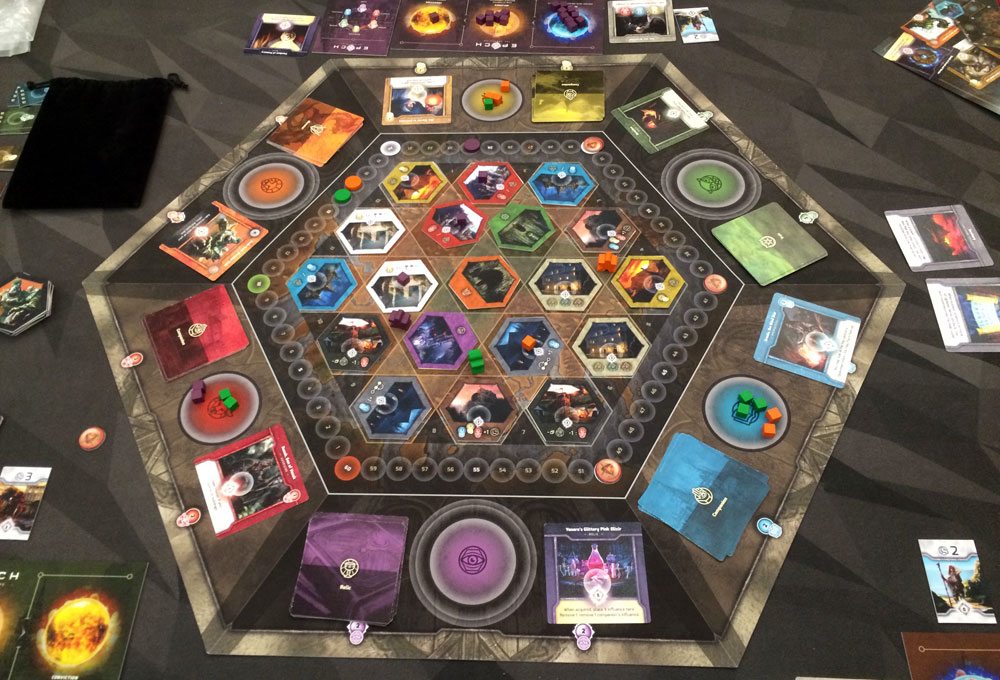
How to Play
You can download a beta version of the rulebook here.
The object of the game is to have the most honor by the time the epoch ends, which occurs based on the variable end-game triggers.
To set up, each player gets a player board and their corresponding components: a scoring marker, influence cubes, standee, a Wretch card, a base speed token, and a randomly dealt Journey card. The Journey card indicates the player’s starting position, what companion they start with, and what types of primary attributes they’ll start with.

You begin the game with 9 cubes in your “potential,” 9 cubes in your “influence,” and 1 cube in your “conviction.” Potential cannot be spent and must be upgraded to influence to be useful; once unlocked, potential usually stays unlocked. Influence is use to mark what attributes you have (and how much), and it is spent to influence your companions. Conviction is used to take control of certain map tiles, and can also be spent to prevent a companion from dying when fighting monsters. Whenever cubes are returned to you (or when conviction is spent), it is placed in the influence bubble on your dashboard.
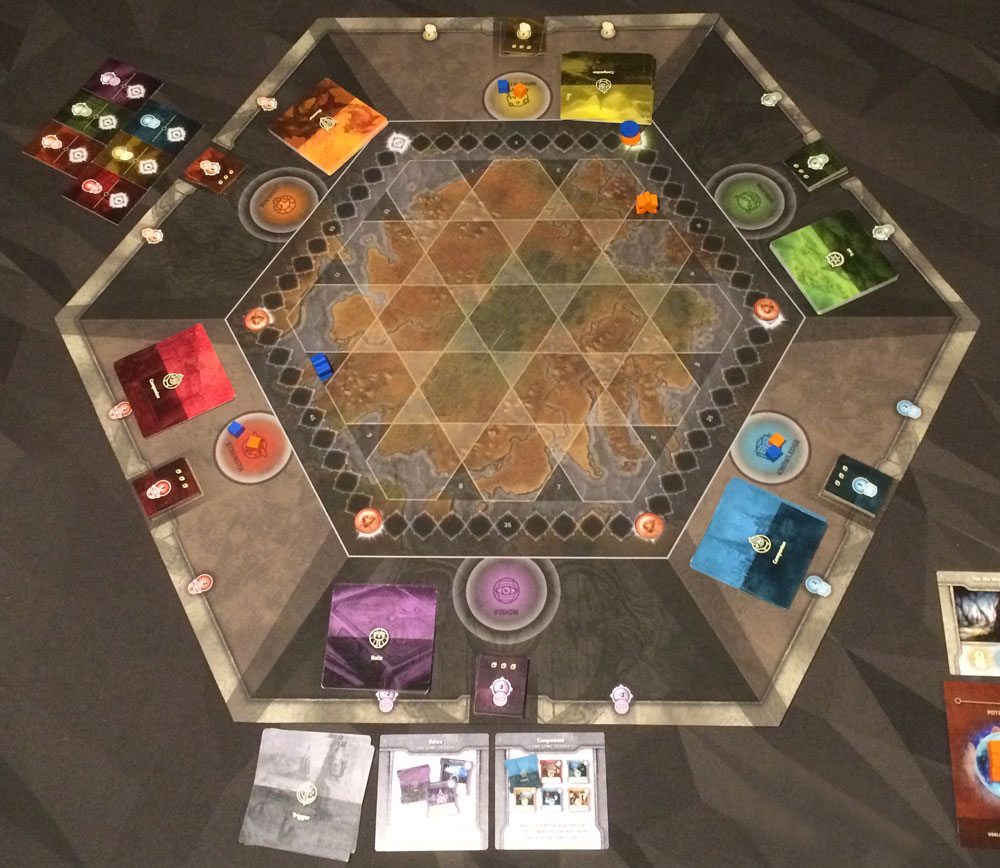
To finish setup, shuffle each deck of cards (Relics, Monsters, Traits, and 3 colors of Companions) and place them on the various deck spaces around the board. The proficiency tokens are also placed on the board matching the various attributes. Mastery tokens and mount upgrade tokens are set aside, and the location hexes are placed into the bag and mixed up. The four trigger tokens are placed at the 20, 30, 40, and 50 spots on the scoring track. Finally, two Trigger cards are drawn and placed face-up.
On your turn, you do these three things in any order: Travel, Activate a Character, Tile Action/Upgrade. There are also some free actions, like Heroic Conversion and Gain Proficiency.
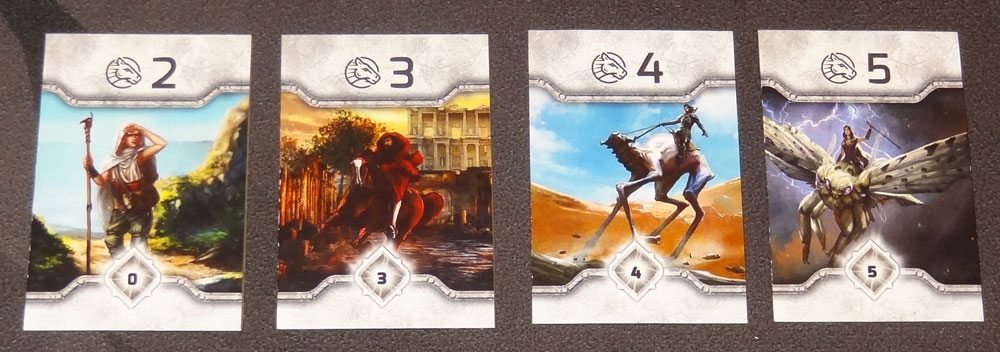
(Prototype shown) Photo: Jonathan H. Liu
Travel: This one’s pretty simple. Move a number of spaces up to your speed. You start with a base speed of 2—on foot—but you will be able to upgrade your mount at a Command Post, which increases your speed and also gains you honor. You may pass through other players but may not end your turn on the same space. Once you stop moving, draw location hexes from the bag to fill in any empty spaces around you.
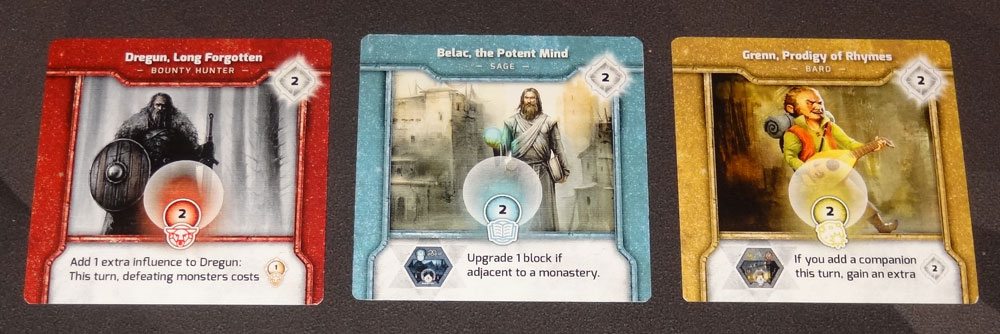
Activate a Character: You may activate either yourself (your Wretch card) or one of your Companions. Activating yourself is free, and gains you one primary attribute of your choice. Activating a Companion costs you one influence (placed on the Companion card) but gains you two of a particular primary attribute, and also puts that Companion’s special ability into effect for your turn.

Tile Action/Upgrade: You may either act on a location tile, or upgrade a block. Upgrading a block simply means moving a block from potential to influence or from influence to conviction.
Acting on a tile includes using a tile’s ability and taking control of it. You must be adjacent to a location to use it. There are various locations that will let you gain attributes or spend them to take particular actions, like upgrading your mount, upgrading blocks, retrieving influence from your Companions, or recruiting new Companions. Most of the locations have multiple copies.
If the location has a bubble with the honor icon in it, you may also optionally take control of it. It costs 1 conviction (placed on the bubble) if it’s currently empty, or 2 conviction (1 on the bubble, one returned to influence) to take over control from another player. You gain 3 honor when you take control of a location, and also every time an opponent uses that location.

(Prototype shown) Photo: Jonathan H. Liu
There are four special locations that are unique and cannot be controlled. The first three are tied to the secondary colors—purple, orange, green—and those are where you go to gain Relics, fight Monsters, or acquire Traits. The Academy lets you roll the white die and gain an attribute of the type rolled, plus you get one additional re-roll if you didn’t already have the attribute gained.

(Prototype shown) Photo: Jonathan H. Liu
Each of the secondary cards gives you 5 points when acquired, as well as some bonus effect. Traits (green) are gained by spending 2 Wisdom; they give you a passive ability that is in effect at all times. Relics (purple) are gained by spending 2 Vision; when acquired, you may place influence on them, which can then be spent for powerful effects; they can be recharged by visiting the Arcane Tower and spending an action. Monsters (orange) are fought by spending 2 Courage; they give you bonus points at the end of the game if you fulfill particular requirements.
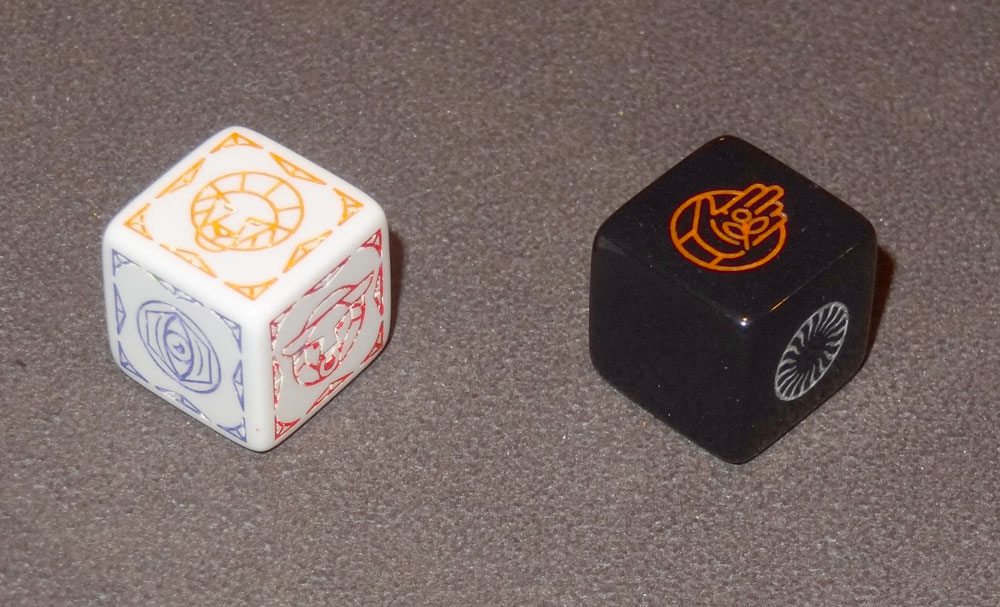
When you fight a monster, you also roll both dice. The white die awards you an attribute, and the black die shows the effects of fighting the monster. The circle icon indicates a long, grueling fight that causes fatigue, and you must add 1 influence to each of your Companions. The Companion icon means one of your Companions has died—you choose a Companion and remove it from the game, retrieving any influence cubes that were on it. You may spend 1 conviction to prevent a Companion from dying.
Heroic Conversion: At any time, you may convert two primary attributes into one secondary attribute, retrieving the extra influence back to your dashboard. However you may not split a secondary attribute into two primary attributes.
Gain Proficiency: At any time during your turn, you may gain a proficiency tile (if available) by spending 3 of an attribute to take the corresponding tile. The tile is not worth honor itself, but represents 3 of that attribute at the end of the game when calculating mastery bonuses, and then frees up your influence cubes to be spent elsewhere.

The game end is determined by the Triggers. There are two in place at the beginning of the game, but others may be added or removed during the course of the game. When a player reaches a trigger token on the scoring track, the next Trigger card is put into play. The player may then spend 3 attributes to remove one Trigger from play.
If the requirements of a Trigger card are met, then you finish the round and play one more full round, and then the game ends.

(Prototype shown) Photo: Jonathan H. Liu
At the end of the game, players will score bonus points for mastery of the attributes. Whoever has the most of a particular attribute—cubes on the board, proficiency tokens, and cards of that color—gains the mastery token for that attribute, which is worth honor. If there is a tie, nobody gets the mastery token. Also, if you have claimed any Monster cards, you score bonus points for meeting those criteria. The highest score wins.
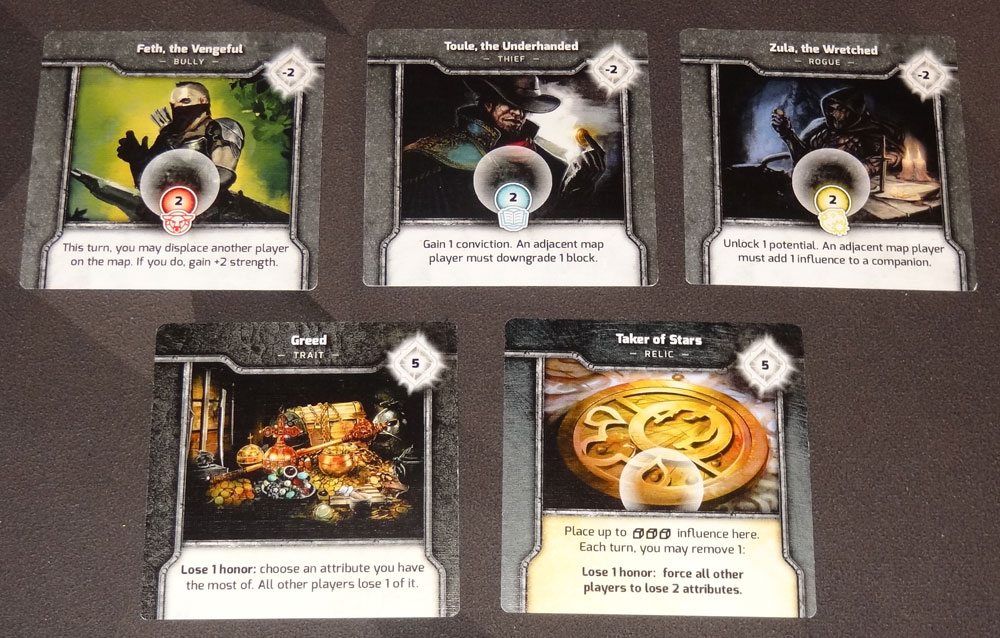
If you want a bit more “take that” in the game, you can mix in the optional Treachery cards at the start of the game. These have black borders, though they will be mixed into the Companion, Relic, and Trait decks based on the card backs. Treachery cards typically cost you honor, either when you claim them or when you use them, but then have negative effects on your opponents.
The Verdict
I’ve played a few iterations of Epoch: The Awakening since I first met Marc Neidlinger at GameStorm a couple years ago, and it’s been cool to see the game develop and evolve. Your character in the game also develops and evolves as you play, but how it grows is up to you: you might seek out Companions to aid you, or you might build up your courage to face Monsters. Do you want to upgrade your mount so you can fly across the island, or huddle down and take control of locations to earn honor?

When you first begin, you’re fairly limited: you move slowly, you only have one Companion, and you have a small amount of influence to spend. Your approach may depend on the locations you find nearby. Since you only get to activate one companion and take one location action each turn, you have to decide how to maximize the benefits you get from them.
Once you start gaining cards, however, your path becomes more clear: if you slay a Monster, you may want to pursue the bonus honor it rewards. If you gain a Trait, that may nudge you toward a particular course of action. I’ve seen players upgrade all of their potential so they had a lot of influence to spread around, so they didn’t need to spend actions retrieving them from their Companions; but I’ve also seen players who didn’t upgrade any at all, and just repeatedly gained and spent attributes, cycling the same small set of influence cubes.
The Trigger cards are an interesting way of making the ending a little unpredictable—each time you play, you may get a different combination of Trigger cards, not to mention those that may be added or removed during play. It makes the game a race: if you’re first to the trigger token, you get more control over when the game will end, potentially choosing a new Trigger card that you’ve already achieved in order to end the game more quickly. I do have to say that I was intrigued with a prior version of the rules in which the player with the lowest honor got to make the decision rather than the player who passed the trigger token—that turns it into something of a catch-up mechanic, where the player in last can try to prolong the game in order to score more points before it’s all over. But I’m a catch-up mechanic sort of guy, and it sounds like Neidlinger prefers the game to accelerate toward the end, with the possibility of surprise game-ending moves. With the Trigger cards, it is possible to end the game very quickly if you focus on fulfilling those criteria, but reaching those criteria doesn’t necessarily mean you have the highest score, so there’s a balance between scoring points and ending the game while you’re ahead.

I’ve enjoyed Epoch, but I do have to admit that it has gotten a mixed reception from the people I’ve played with. Some people have enjoyed it, and some didn’t feel it was quite exciting enough. I think it’s more about managing and manipulating resources (in this case, attributes), and that there are aspects that feel a bit abstracted. Perhaps the most abstracted is fighting Monsters: you just spend 2 Courage, and you defeat the Monster. You may incur some sort of penalty, but you’re guaranteed to defeat it if you spend the Courage. Gamers looking for more complex or engaging battle mechanics may be disappointed in that aspect. Monsters aside, though, I liked the idea of building up things like Knowledge and Inspiration, using Wisdom to gain new Traits or Vision to acquire Relics.
The game has a nice mix of exploration, power combinations, and resource management. I think what I enjoy the most about Epoch is the way that you can choose your own path to regain honor—the game does not lock you into a particular path. You can find certain combinations of Traits, Companions, Relics, and Monsters that work well together, but you also can’t discount the importance of gaining mastery of attributes because there’s a lot of honor at stake there, too. As you become familiar with the cards, you might search for particular cards rather than just taking whatever is available, and you can choose a strategy more proactively rather than reactively.
Epoch: The Awakening is a little hard to categorize, because I can’t just say “it’s like X, but with Y” and sum it up easily. That’s a good thing, in my opinion: it means that it’s doing something new and doesn’t just feel like a retread of games I’ve already played. If you like games of exploration and power combinations, check out the Epoch Kickstarter page for more!
Disclosure: I received a prototype of this game for review.

